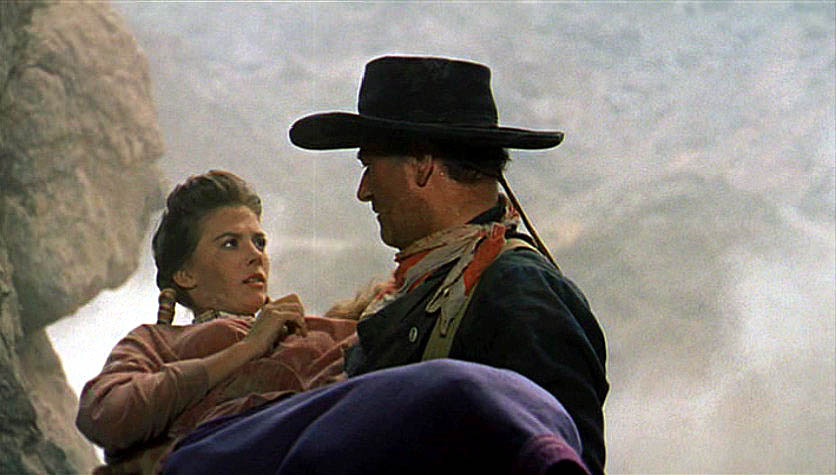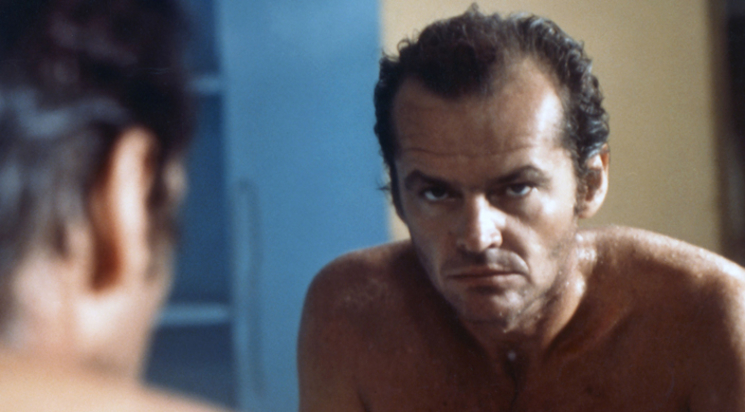The Passenger (1975) Directed by Michelangelo Antonioni
The Passenger is Italian director Michelangelo Antonioni's last great film, and it serves as a handy compendium of all the great director's principal themes: psychological and social alienation; fluidity of identity; dilemmas of authenticity; displacement of self; and the difficulty in believing in anything that is genuinely worth the effort. Elements of search, a preoccupation with architecture, and the solution of an existential mystery are also frequent refrains of his work. They are all present in
The Passenger. David Locke (Jack Nicholson) is a BBC reporter in North Africa trying to get material about a rebellion taking place in the desert. He is frustrated in his efforts, and pretty clearly frustrated with his life in general. When Robertson, the only other English-speaking visitor in his way-off-the-beaten-path hotel, dies of a heart attack, David decides to trade identities. Unhappy with his life, he will move on to another life like a hermit crab changing shells. He has no idea who Robertson is, but his demise represents an opportunity too tempting to ignore. Robertson left a schedule calendar behind, and David follows it to the letter, curious about where it may lead. Reports of his death bring about a search by his wife for more information--she acknowledges that she cares more about him now that he is dead than she did when he was alive. David picks up a free spirit (Maria Schneider) along the way, and she goes along for the ride more out of a spirit of adventure than anything else. She is curious about who he thinks he is now. David replies he thinks he just might be a gun-runner. Turns out the revolutionaries are after him, too.
This sounds on paper like a potentially fast-paced plot. It isn't. David doesn't seem to care enough about his own life to feel any urgency, and the pace of the film, rightly, reflects his ennui. Though Antonioni famously hated actors, he gets a fine, scaled-down performance by Nicholson, a performance more about body language and vocal inflection than about the actual words that he is saying. A man discovering that his new life is not any more satisfying than his old life, David ends up feeling just as aimless as before. He literally can't escape his past as his wife is doggedly on his trail (her search for him clue by clue echoes in much less brilliant fashion David Hemmings' search for certainty in the still photos of
Blow Up). In the end, believing in anything is beyond David and he suffers an ironically similar fate to Robertson.
At the time of the making of
The Passenger, Jack Nicholson was probably the biggest Hollywood star around and one of the US' best actors. Nicholson was great at throwing fits in movies to the point that the audience came to expect them to occur at some point in a Nicholson film. I thought it was incredibly clever that Antonioni followed this popular tradition, but gave Nicholson the fit about ten minutes into the movie. Sort of like saying, "Now we have that out of the way, the rest of the movie is mine." Antonioni was fascinated by architecture in some of his films,
La Notte being a prime example. We get a fair amount of Gaudi's wonderful architecture in
The Passenger. Usually Antonioni seems to see architecture as a symbol of our society's coldly efficient, dispassionate nature. However, Gaudi is the polar opposite of the no-frills Bauhaus approach. Gaudi's dwellings suggest liveliness, delight and imagination. Gaudi's buildings and parks help to define Barcelona, where a good chunk of the movie is shot, but its inclusion in the movie seems like the wrong kind of counterpoint. Gaudi's works is one of the things that make life worth living, so it doesn't seem to really belong in this movie.
It almost goes without mentioning that Antonioni is arguably the master of the cinematic image, none better in my opinion. His colour films especially are stunningly beautiful, but his technique on all scores is impeccable. There is a tracking shot at the end of this movie that runs for about six minutes without a cut. The shot starts in David's hotel room with him resting on a bed and then very slowly closes in upon the bars on his bedroom window as we watch what is taking place outside. Then, as if by magic, with no cut, the camera goes through the bedroom window as if the bars evaporate, slowly circles the courtyard in front of the hotel and swings back around 360 degrees so that we end up looking back at David's room but from outside the window now. The composition within the frame while all this is going on is of great importance and exquisitely staged. To me this is one of the most dazzling sequences in cinema. I never get tired of watching it. Indeed, I never get tired of any of Antonioni's movies.
subtitles




